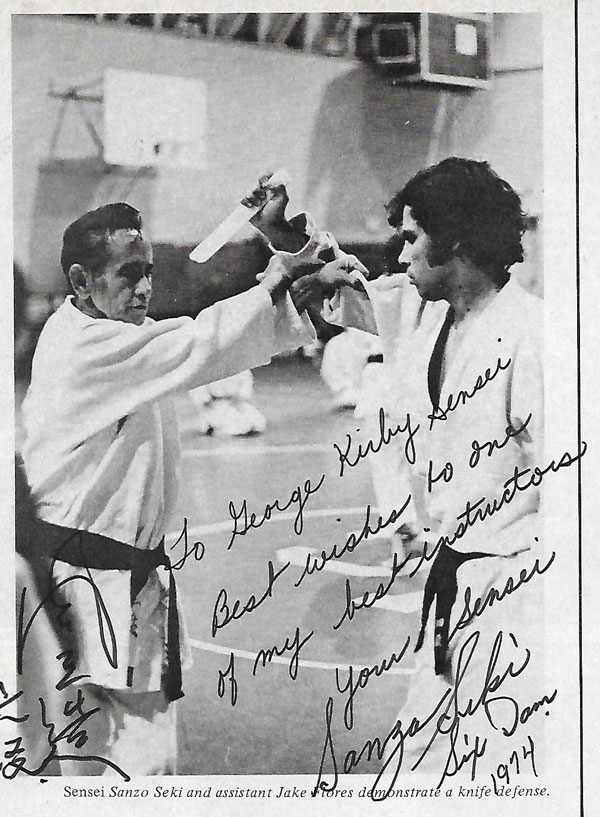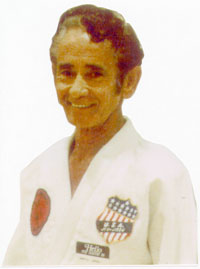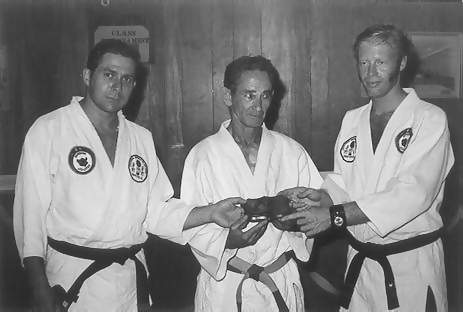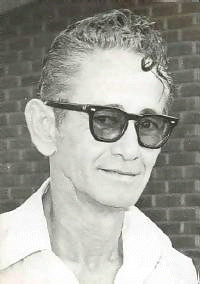
|
|
|
|
Ju-Jitsu: Basic Techniques of the Gentle Art - Expanded Edition [Black Belt Books 2011] Jujitsu: Advanced Techniques for Redirecting an Opponent's Energy[ Black Belt Books 2015] Jujitsu: Toward One Technique [Black Belt Books 2019]
In 1992 Panther Productions released the 8-DVD instructional series, entitled Black
Belt Ju-Jitsu. Prof. Kirby has also written numerous articles for
Black Belt, Inside Karate and other
martial arts magazines. In addition, Prof. Kirby has compiled an
impressive list of additional instructional videos, available as MP4
files, which can be accessed by clicking here.
There are additional short instructional clips on YouTube under the
heading of "Budoshin Ju-Jitsu".
 As a strong believer in community service, Prof. Kirby was selected to
serve as a a Defensive Tactics Consultant for the Los Angeles Police
Dept. in 1994, [after the Rodney King incident], serving on their Civilian Martial Arts Advisory Panel.
In that capacity he was involved in developing and final reviewer
for the new arrest & control program for officers. He was also the
only martial artist involved in designing the officer A/C competency
evaluation [testing] process. He continued to serve the LAPD
CMAAP until its termination in
2007. He also developed a
Defensive Tactics program for the state of Nevada in the 1980's and has
taught arrest control techniques to private security firms and a variety
of local and national law-enforcement personnel. In 2006 Prof. Kirby
became a certified POST [Police Officer Standards Training] instructor.
In 2007 Prof. Kirby was selected to be a member of FLEOA [Federal Law
Enforcement Officers Association] and ILEETA [International Law
Enforcement Educators and Trainers Association]. As a strong believer in community service, Prof. Kirby was selected to
serve as a a Defensive Tactics Consultant for the Los Angeles Police
Dept. in 1994, [after the Rodney King incident], serving on their Civilian Martial Arts Advisory Panel.
In that capacity he was involved in developing and final reviewer
for the new arrest & control program for officers. He was also the
only martial artist involved in designing the officer A/C competency
evaluation [testing] process. He continued to serve the LAPD
CMAAP until its termination in
2007. He also developed a
Defensive Tactics program for the state of Nevada in the 1980's and has
taught arrest control techniques to private security firms and a variety
of local and national law-enforcement personnel. In 2006 Prof. Kirby
became a certified POST [Police Officer Standards Training] instructor.
In 2007 Prof. Kirby was selected to be a member of FLEOA [Federal Law
Enforcement Officers Association] and ILEETA [International Law
Enforcement Educators and Trainers Association].Prof. Kirby was a public school teacher for 39 years, since 1967 until his retirement in 2006. He has a MA degree in Social Science/Political Science, Standard Secondary Teaching Credential, Standard Jr. College Teaching Credential, and Administrative Services Credential from the state of California. He was the chairman of the Social Science Dept., U.S. Grant High School, Van Nuys, from 1992-2006, where he taught Advanced Placement U.S. Government and Honors Economics. While Prof. Kirby may have retired from teaching for the Los Angeles Unified School District, he strongly believes that "retirement" is relative thus has not retired from teaching. In August, 2007, Prof. Kirby started teaching Budoshin Ju-Jitsu at College of the Canyons, Santa Clarita, CA. The program was suspended due to state budget cuts in August, 2010. Students were able to take his class up to four semesters [state maximum] of this Physical Education Course, and earn CSU/UC transfer credit for each semester completed.
[Return to top of page.]
 Professor
Sanzo Jack M. Seki, whose legal name was changed to Jack M. Haywood in
1943, was born in Los Angeles, CA., USA, on July 7, 1914. His father was
Japanese his mother was of Irish American descent. Jack Seki moved to
Japan at a very early age. Although Seki's father, Sanzo Seki [b:1888 -
d:?], was a Ju-Jitsu master himself, he also sent Seki to study directly
under the legendary Dr. Jigoro Kano, an expert in Tenjin-Shinyo Ryu
Jujitsu [Hachinosuke Fukoda, Sensei and Masatomo Iso, Sensei] and Kito-Ryu
JuJitsu [Tsunetoshi Iikubo, Sensei] and founder of modern day Judo. Some
sources indicate that Seki was awarded a sandan in Judo by Kano although
there is no documentation available. After studying under Kano, Seki
returned to master the art as taught by his father. Some sources also
indicate that he earned an Ikkyu grade in Kendo, but that is also
unverifiable at this time. According to some sources Seki may have been
enrolled at Doshisha College in Kyoto, Japan Professor
Sanzo Jack M. Seki, whose legal name was changed to Jack M. Haywood in
1943, was born in Los Angeles, CA., USA, on July 7, 1914. His father was
Japanese his mother was of Irish American descent. Jack Seki moved to
Japan at a very early age. Although Seki's father, Sanzo Seki [b:1888 -
d:?], was a Ju-Jitsu master himself, he also sent Seki to study directly
under the legendary Dr. Jigoro Kano, an expert in Tenjin-Shinyo Ryu
Jujitsu [Hachinosuke Fukoda, Sensei and Masatomo Iso, Sensei] and Kito-Ryu
JuJitsu [Tsunetoshi Iikubo, Sensei] and founder of modern day Judo. Some
sources indicate that Seki was awarded a sandan in Judo by Kano although
there is no documentation available. After studying under Kano, Seki
returned to master the art as taught by his father. Some sources also
indicate that he earned an Ikkyu grade in Kendo, but that is also
unverifiable at this time. According to some sources Seki may have been
enrolled at Doshisha College in Kyoto, JapanPrior to World War II, Seki was given the option of being drafted into the Japanese army or emigrating to the United States. Fortunately he chose the latter and returned to the U.S. in the mid-1930's. With his martial arts training current information says that he worked for the U.S. Army Air Force as a weaponless defense instructor. It is also possible that he may have served as a translator in the Pacific theatre during the war. Information as of 10/26/2006, according to official records [releasable under the Freedom of Information Act] Seki served in the U.S. Army from 1941-1944 assigned to Company A, 34th Signal Training Battalion. He was awarded the American Defense Service medal, WWII Victory Medal, WWII Service Lapel Button and a Good Conduct Medal. His rank was private, 1st class. More detailed records were probably destroyed in a 1973 fire at the National Personnel Records Center [Military Personnel Records, St. Louis, MO]. Another reliable source, US Army Signal Center, Ft Gordon, GA,11/14/06] indicates that the Company A, 34th Signal Training Battalion was stationed in Africa, Italy Sicily, thus probably discounting the verbal history that he may have served as a translator in the Pacific theatre during the war -- unless it was a cover.  Some
time after the war was over Prof. Seki went to work for Lockheed
Aircraft Co., where he was officially employed as a manufacturing
research mechanic [confirmed 2010] from 1952 until his
retirement in 1986. At that time he retired to Bullhead City, AZ, where
he worked for a helicopter company for a few years. In declining health
from emphysema and severe pulmonary disease caused by years of smoking,
Prof. Seki was eventually placed in a nursing home until he passed away
on April 20, 1998. Some
time after the war was over Prof. Seki went to work for Lockheed
Aircraft Co., where he was officially employed as a manufacturing
research mechanic [confirmed 2010] from 1952 until his
retirement in 1986. At that time he retired to Bullhead City, AZ, where
he worked for a helicopter company for a few years. In declining health
from emphysema and severe pulmonary disease caused by years of smoking,
Prof. Seki was eventually placed in a nursing home until he passed away
on April 20, 1998.Seki was an avid martial artist and dedicated instructor. His whole life revolved around Ju-Jitsu. He held yudansha grades in Judo, Karate, Aikido, and Ju-Jitsu, most of which he earned in Japan. He was ultimately promoted to Kudan [9th dan] in Ju-Jitsu. He taught at the Burbank YMCA in the early 1960's and then moved his instructional program to Los Angeles Valley College, where he taught Ju-Jitsu four nights a week [for $1.25/month] through their community service program. In the early 1980's he moved his program to the Victory-Vineland Recreation Center, Van Nuys, until his retirement from Lockheed in 1986.  Seki
was demanding on the mat. Although his physical workouts were strenuous,
his demands upon students' mental attitude was even greater. The higher
you were in rank the more you would be verbally harassed. Seki did this
to weed out students [and black belts] who would get upset with his
harassment. Seki said many times that if your "ticky-ticky" gets hurt by
what people say about you [you get upset] you have no business being
in the martial arts. This was his way of weeding out those who were weak
in spirit and mind. He took this approach because Ju-Jitsu, as taught by
Seki, was such a devastating martial art. He did not feel that students
who couldn't control their emotions should study this gentle art. Seki
was demanding on the mat. Although his physical workouts were strenuous,
his demands upon students' mental attitude was even greater. The higher
you were in rank the more you would be verbally harassed. Seki did this
to weed out students [and black belts] who would get upset with his
harassment. Seki said many times that if your "ticky-ticky" gets hurt by
what people say about you [you get upset] you have no business being
in the martial arts. This was his way of weeding out those who were weak
in spirit and mind. He took this approach because Ju-Jitsu, as taught by
Seki, was such a devastating martial art. He did not feel that students
who couldn't control their emotions should study this gentle art.[Return to top of page.]
[Return to top of page.] |
|||||||||||||||||||||||||||||
|